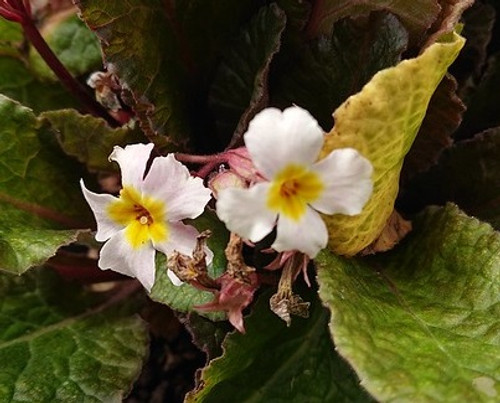Plant Overview
A favourite British native of the hedgerows and meadows, now sadly largely in decline across the country. Fragrant lemon-yellow flowers in spring.
Flowers from March to May.
Height: 18cm
Common names: Cowslip; Paigle; Herb Peter; Keyflower; Palseywort; St Peter's Wort; Key of Heaven; Our Lady's Keys; Fairy Cups; Bunch of Keys; Cooslop; Cow Slap; Milk Maidens; Tisty-Tosty; Palsy Wort; St Peter's Herb; St Peter's Keys.
The common name cowslip may derive from the old English for cow dung, probably because the plant was often found growing amongst the manure in cow pastures. An alternative derivation simply refers to slippery or boggy ground; again, a typical habitat for this plant.
The cowslip is frequently found on more open ground than the primrose, including open fields, meadows, coastal dunes and clifftops. The plant suffered a decline due to changing agricultural practices throughout the 1970s and 1980s in Britain. It may therefore be rare locally, though where found it may be abundant.
Cowslips and Primroses are the food of the Duke of Burgundy Fritillary butterfly, which lays its eggs in small numbers under the plants leaves.
Supplied in either 7cm or 9cm pots, depending on the time of year.
Myth and Legend
The shape of the pendant flowers resembles a bunch of keys and it is a tradition that carrying a bunch of Cowslips will help one find treasure.
With the spread of Christianity, the plant became associated with St Peter, as the Key Bearer and the Virgin Mary. Legend tells that one day St Peter, The Rock of the Church, became aware of a rumour that some souls were entering heaven by a back door and not by the Pearly Gates, to which he held the keys. He became so agitated at the irreverence of such actions that he dropped his keys. They fell to Earth and took root in the soil. They grew into the Cowslip and hence this flower is said to be the key which opens rock and reveals hidden treasure.
Cowslips have long been associated with the world of faeries and they are said to love and protect them and to hide in the flowers when frightened. Carrying the flowers is thought to bring good luck, and one belief claims that it will enable the bearer to find faerie gold. The plant is credited with the ability to split rocks containing faerie treasures.
In Lincolnshire and Northamptonshire, it was traditional on Whitsunday for girls to make balls of cowslip flowers, sometimes called a 'tisty tosty, and throw them to each other. As they did so they would recite:
Cowslip ball tell me true,
Who shall I be married to?
Each girl would then call out the name of one of the young men in the village. When the ball was dropped, the last name called would be the future husband of the girl who threw it.
An odd superstition says that if a cowslip is planted upside down on Good Friday, it will flower red.
Medicinal
Cowslips have traditionally been used for the treatment of cramps, rheumatic pain and paralysis, hence the common name of Palsy Wort. Cowslip flowers added to wine would treat insomnia, amnesia and migraines.
Eating the flowers was said to strengthen the brain.
Wearing Cowslip flowers is said to restore and preserve the youthfulness of the wearer.
Gerard's Herbal (1597) states: An unquent made with the juice of Cowslips and oile of Linseed, cureth all scaldings or burnings with fire, water or otherwise.
Picture credit: Heavyuser, CC BY-SA 4.0, via Wikimedia Commons







